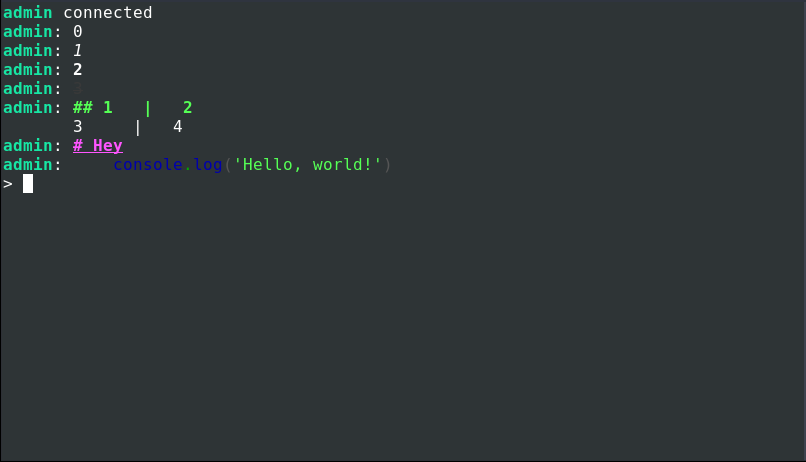Ssh-chat, part 2
Hello, Habr. This is article 2 of the ssh-chat loop.
What we will do:
- Add the ability to create your own design functions
- Add markdown support
- Add bot support
- Increase password security (hash and salt)
Alas, there will be no sending files
Custom layout features
Currently implemented support for the following design features:
@color
-
@bold
-
@underline
-
@hex
-
@box
But it’s worth adding the ability to create your own functions:
All functions are stored in anmethods
So it will be enough to create theregisterMethod
function:
// parserExec.js at end module.exports.registerMethod = function(name, func) { methods[name] = func }
You also need to return this method after creating the server.
// index.js at require part const { registerMethod } = require('./parserExec') // index.js at end module.exports.registerMethod = registerMethod
Now, when creating a server, we can register formatting methods. Example:
const chat = require('.') const { formatNick } = require('./format') chat({}) chat.registerMethod('hello', function(p, name){ return 'Hi, ' + formatNick(name) + '!' })

Markdown support
Markdown is very convenient, so add it using marked terminal
// format.js near require const marked = require('marked'); const TerminalRenderer = require('marked-terminal'); marked.setOptions({ renderer: new TerminalRenderer() }); // format.js line 23 message = marked(message)

Bots
How it will work
let writeBotBob = chat.registerBot({ name: 'botBob', onConnect(nick, write){ write('@hello{' + nick + '}') }, onDisconnect(nick, write){}, onMessage(nick, message, write) { if(message == 'botBob!') write('I\'m here') }, onCommand(command, write) { write('Doing ' + command) } })
onCommand
can be called using @bot(botBob){Command}
Everything for working with bots is described in the file:
let bots = []; // let onWrite = () => {}; function getWrite(bot) { // return msg => { onWrite(bot.name, msg); }; } module.exports.message = function message(nick, message) { // index.js bots.forEach(bot => { try { bot.onMessage(nick, message, getWrite(bot)); } catch (e) { console.error(e); } }); }; module.exports.connect = function message(nick) { // bots.forEach(bot => { try { bot.onConnect(nick, getWrite(bot)); } catch (e) { console.error(e); } }); }; module.exports.disConnect = function message(nick) { // bots.forEach(bot => { try { bot.onDisconnect(nick, message, getWrite(bot)); } catch (e) { console.error(e); } }); }; module.exports.command = function message(name, message) { // bots.forEach(bot => { if (bot.name == name) { try { bot.onCommand(message, getWrite(bot)); } catch (e) { console.error(e); } } }); }; module.exports.registerBot = function(bot) { bots.push(bot); return getWrite(bot) }; module.exports.onMessage = func => { onWrite = func; };

What can be done with bots:
- Load monitor
- Deploy
- Task board
Hash and salt
Why not ssh keys? Because ssh keys will be different on different devices
Create a file in which will be responsible for checking and creating passwords
// crypto.js const crypto = require('crypto'); function genRandomString(length) { return crypto .randomBytes(Math.ceil(length / 2)) .toString('hex') .slice(0, length); } function sha512(password, salt){ const hash = crypto.createHmac('sha512', salt); /** Hashing algorithm sha512 */ hash.update(password); const value = hash.digest('hex'); return value }; function checkPass(pass, obj){ return obj.password == sha512(pass, obj.salt) } function encodePass(pass){ const salt = genRandomString(16) return JSON.stringify({ salt, password: sha512(pass, salt) }) } module.exports.encodePass = encodePass module.exports.checkPass = checkPass
Also a script for salting and hashing a password
// To generate password run node ./encryptPassword password const { encodePass } =require('./crypto') console.log(encodePass(process.argv[2]))
We update in users.json and instead of comparison in lobby.js we use checkPassword
Total
As a result, we have ssh chat with design capabilities and bots.
Final repository
All Articles